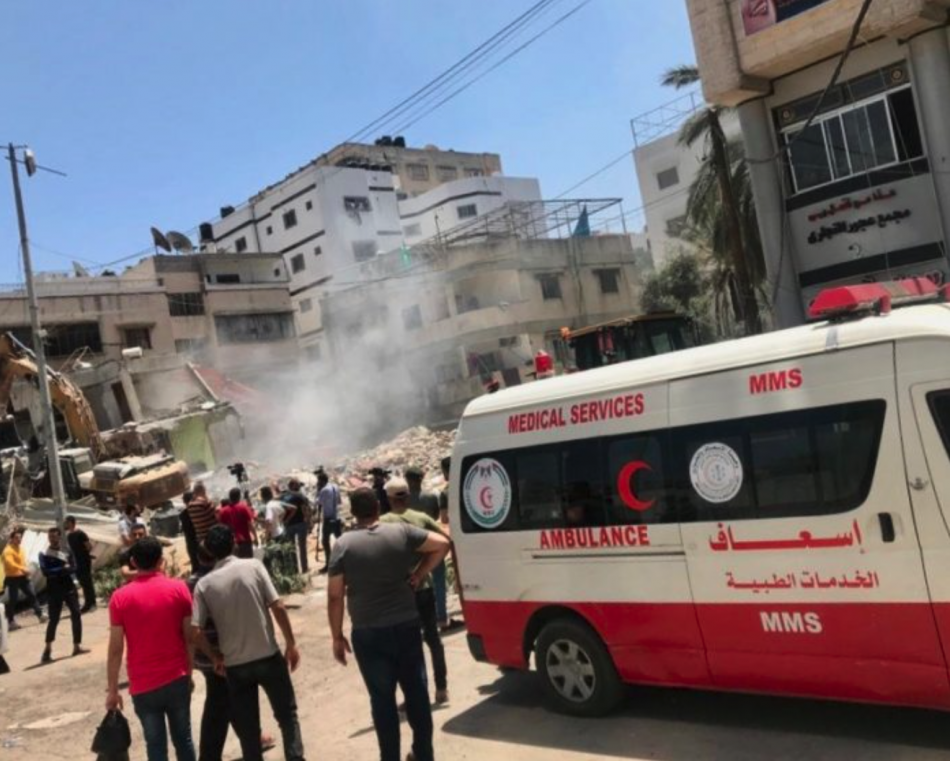GENEVA (AN) — U.N. human rights chief Michele Bachelet raised the possibility on Thursday that Israel's military committed war crimes by launching air strikes in densely populated civilian areas during its latest war with Gaza’s militant Hamas rulers.
Bachelet, who heads the Office of the U.N. High Commissioner for Human Rights, or OHCHR, spoke at a special session of the United Nations Human Rights Council in Geneva to assess Palestinian areas of Gaza, the West Bank and east Jerusalem in the wake of the fourth war between Israel and Hamas.
After a daylong debate, the 47-nation council voted 24-9, with 14 abstentions, to adopt a resolution that establishes a permanent or "ongoing" commission of inquiry to investigate alleged human rights violations and abuses in Palestinian territories, including East Jerusalem, and in Israel, before and after the war. The vote marks the first time the council has authorized a commission of inquiry of any kind with a continuing mandate.
The commission of inquiry is the most powerful form of international investigative body that the U.N.'s top human rights forum can create. The council's resolution directs the commission to examine “all underlying root causes of recurrent tensions, instability and protraction of conflict, including discrimination and repression based on national, ethnic, racial or religious identity."
The two sides agreed to a cease-fire on May 20, which has been holding. Bachelet told the council the war represented the most significant escalation in hostilities between Israel and Hamas since 2014. The war lasted 11 days and killed at least 248 people in Gaza, including 66 children and 39 women, and 12 people in Israel, including two children.
"Although Israel undertook a number of precautions, such as advance warning of attacks in some cases, air strikes in such densely populated areas resulted in a high level of civilian fatalities and injuries, as well as the widespread destruction of civilian infrastructure," said Bachelet.
"Such strikes raise serious concerns of Israel’s compliance with the principles of distinction and proportionality under international humanitarian law," she said. "If found to be indiscriminate and disproportionate in their impact on civilians and civilian objects, such attacks may constitute war crimes."
The latest war erupted when Hamas — which the United States and its allies has designated as a terrorist organization — fired long-range rockets at Jerusalem to support Palestinian protests over threatened settler evictions and clashes with police at Al Aqsa Mosque. Hamas violated international humanitarian law, Bachelet said, by putting military assets in densely populated civilian areas that it used to launch rocket attacks towards Israel.
"These rockets are indiscriminate and fail to distinguish between military and civilian objects, and their use, thereby, constitutes a clear violation of international humanitarian law," she said. "Over the 11 days up to the cease-fire, a number of these rockets killed and injured civilians and caused significant damage to civilian objects, such as public facilities, houses, factories and other civilian structures."
#SS30 | “To avoid next round violence, root causes must be addressed” – @mbachelet on escalation in Gaza and the occupied Palestinian territory
— UN Human Rights Council (@UN_HRC) May 27, 2021
FULL STATEMENT ➡️https://t.co/2U3GL65Nlo pic.twitter.com/TKKpLNjK8b
#SS30 continues at 15.00 Geneva time (+1hour GMT) HRC heard from 39 speakers in morning meeting, including FM of #Palestine Riyad Al-Maliki and Amb Meirav Eilon Shahar of #Israel Action on draft resolution expected around 17.30 today. Follow on https://t.co/ibzE569aA0 pic.twitter.com/69xCBPiO8Y
— UN Human Rights Council (@UN_HRC) May 27, 2021
'Terrorists' vs. 'colonizers'
Diplomats from Israel and Palestine spoke before the council, where most of the participation was by videoconference. Members of the Organization of Islamic Cooperation proposed the resolution to create the permanent commission on human rights violations in Israel, Gaza and the West Bank.
The resolution won the backing of China, Mexico and Russia and was opposed by Germany and the United Kingdom. Nations such as Brazil, France, India, Italy, Japan and South Korea all abstained. Its passage is likely to be ignored by Israel and to reignite longstanding accusations of anti-Israel bias among council members that were cited as a reason for the United States' withdrawal under former President Donald Trump's administration.
Israel's Ambassador Meirav Eilon Shahar said Hamas fired more than 4,400 rockets at Israeli civilians from Palestinian homes, hospitals and schools.
"Each one of these rockets constitutes a war crime," she said. "Each one of these rockets constitutes a tragedy. I want to ask member states participating in today’s session: what would you do if rockets were fired at Dublin, Paris, or Madrid? How would you respond if terrorists attacked Beijing, Islamabad, or Moscow?"
Palestinian Foreign Minister Riad al-Maliki emphasized that Israel has killed, arrested and displaced many of his people, while colonizing Palestinians' territory and "depriving them of a future" in which they can live in safety and peace.
"Israel is an occupying power, and it has its duties," he told the council. "Like any free people, our people have risen to defend their land, their right to life, and defend their homeland and its sanctities, and it believes in the inevitability of victory. However, like any colonial regime, we have seen, on live broadcasts, its response with the killing, destruction and execution of entire families."
Separately, the United Nations launched an emergency appeal at a virtual news conference on Thursday seeking US$95 million in donations for humanitarian needs and for rebuilding Gaza's schools, hospitals and basic infrastructure over the next three months. Lynn Hastings, the U.N. humanitarian coordinator in Gaza, said the war destroyed or damaged 58 educational facilities along with 17 hospitals and health care centers.









